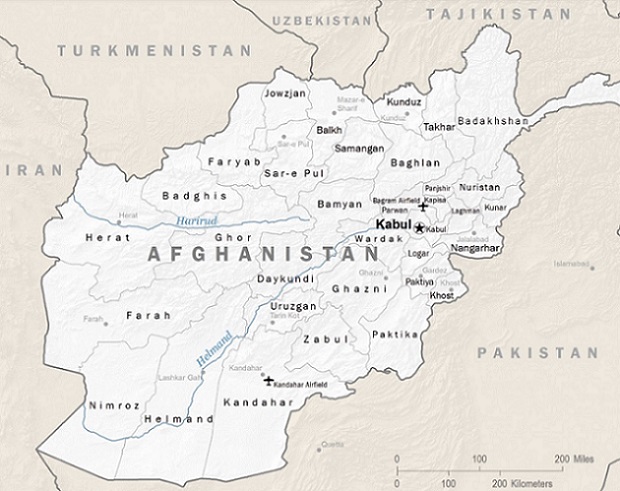

For Turkey, an entrenchment in Afghanistan will turn Kabul into a springboard for forays into broader Central Asia—a resource rich region with which Ankara shares deep seated cultural and linguistic ties (Image courtesy: US Department of Defence)
<p>
<strong>Turkey and Pakistan, in partnership with China, are working together to exercise dominance over Afghanistan in anticipation of American withdrawal from the strife-torn nation, often known as the &ldquo;graveyard of empires&rdquo;.</strong></p>
<p>
In its major expose, the website greekcitytimes.com points to the crucial end-of-March visit to Turkey by Pakistan&rsquo;s Chairman of Joint Chiefs of Staff Committee (CJCSC), General Nadeem Raza, to put together the pieces of the jigsaw puzzle to dominate the region. Gen. Raza visited Turkey from March 27-April 2, the web portal reported.</p>
<p>
The visit fused with Turkey&rsquo;s growing ambition to revive its Ottoman empire dreams, which include regaining its cultural hegemony in the Turkic region of Central Asia, and Afghanistan. Separately, in the Levant, Turkey&rsquo;s President Recep Tayyip Erdogan, wants to fulfil his revivalist neo-Ottoman ambitions by rolling over Syria, relying on well-trained Jihadi fighters, backed by the Turkish military for relentless subversion.</p>
<p>
Also, the area known as Hejaz, now part of Saudi Arabia where Islam&rsquo;s two holy mosques are located is also on Erdogan&rsquo;s radar&mdash;an aspiration which is bound to re-craft the map of West Asia and North Africa that emerged after World War I.&nbsp;</p>
<p>
<img alt="Afghanistan" src="https://www.indianarrative.com/upload/news/cec6327fafa8a87a578baf2c2dc9a2eb.jpg" style="width: 100%; height: 100%;" /></p>
<p>
Turkey&rsquo;s Chief of General Staff, General Ya&#351;ar Guler, hosted Gen. Raza at the Turkish General Staff Headquarters on March 30.</p>
<p>
Gen. Raza&rsquo;s visit follows the December 22-23 apex meeting of the Turkey-Pakistan High Level Military Dialogue Group (HLMDG), led by Pakistani Defence Secretary Mian Muhammad Hilal Hussain, where nuclear weapon collaboration was on the cards.</p>
<p>
&ldquo;Erdogan has already aired his obsession about developing the &lsquo;Caliphate atom bomb&rsquo; to fulfil his neo-Ottoman aspirations. China and Pakistan have been facing charges of illegal sale of missiles and creating a clandestine proliferation market.&rdquo;</p>
<p>
Four major themes were discussed to fulfil the broader strategic goals of Turkey, Pakistan and China during Gen. Raza&rsquo;s visit.</p>
<p>
Afghanistan, undergoing a major transition, marked by extreme political fluidity was a top item on the agenda. This is an area where the interests of Turkey, Pakistan, and China strongly converge. For Turkey, an entrenchment in Afghanistan will turn Kabul into a springboard for forays into broader Central Asia&mdash;a resource rich region with which Ankara shares deep seated cultural and linguistic ties.</p>
<p>
For Pakistan, Turkey&rsquo; assistance is badly needed to re-acquire its &ldquo;strategic depth&rdquo; to counter India and Iran, and to seal a security threat from across the Durand Line.</p>
<p>
For China, tighter control will allow the extension of the China Pakistan Economic Corridor (CPEC), to access Afghanistan&rsquo;s resources including lithium, the feedstock of Beijing&rsquo;s electric car revolution. It would also help prevent the seepage of Islamic extremists from Afghanistan into the Wakhan corridor, and help prevent the destabilisation of China&rsquo;s strategic Xinjiang region.</p>
<p>
Unsurprisingly, the discussions held during the meeting reveal that Pakistan wants Turkish forces to replace NATO and American forces following US military withdrawal, the article said.</p>
<p>
Further, Pakistan also conveyed that through the help of the Haqqani Network (HQN), it has already managed to convince the Taliban to allow Turkish forces to continue their deployment as well as to send more troops to Afghanistan.</p>
<p>
&ldquo;Both of them also brainstormed on efficiently using terror organisations like Al-Qaeda, Islamic State, and HQN for creating a more conducive environment in Afghanistan for Turkey,&rdquo; the website reported.</p>
<p>
The writeup further quoted defence experts as expressing their apprehensions about Turkey&rsquo;s intent to deploy Islamic State terrorists fleeing from Syria to Afghanistan.</p>
<p>
&ldquo;With this, it is expected that the Islamic State would become stronger in the country with infiltration of Syrian-based terrorists into it. Until now, it was being driven by cadres from Pakistan based terror entities deployed by Pakistani agency ISI.&rdquo;</p>
<p>
Apart from promoting Afghanistan&rsquo;s return to radicalisation, the article pointed out that inclusion of Turkey as part of an expanded CPEC was also part of the discussions.&nbsp;</p>
<p>
<span style="font-size:20px;"><strong>ALSO READ: <a href="https://www.indianarrative.com/world-news/baloch-insurgent-group-warns-that-iran-china-deal-can-endanger-chabahar-project-79307.html">Baloch insurgent group warns that Iran-China deal can endanger Chabahar project</a></strong></span></p>
<p>
It spotlighted the Pakistan&rsquo;s Federal Minister for Maritime Affairs, Ali H Zaidi, had earlier met the Turkish ambassador to Islamabad, Mustafa Yurdakul, to discuss Turkish entry and participation in the Port Qasim in Karachi within the ambit of CPEC. Two important deals were struck following the meeting&mdash;Turkey&rsquo;s Sanmar Shipyards would deliver four LNG compatible ASD Tugs and two pilot boats to the Port Qasim Authority at a cost of $33.46 million.</p>
<p>
Referring to China, the website, citing reports said that Beijing had become a major factor in boosting Pakistan&rsquo;s air power to the next level by helping it develop a fifth-generation fighter jets, in coordination with Turkey. The trilateral nexus is also coming into fruition for developing drones, which Turkey had supplied to Azerbaijan, with telling effect, in its recent war with Armenia.&nbsp;</p>
<p>
The website highlighted that the Pakistani delegation visited the Bakyar National S/UAV Research &amp; Development and Production Centre as its first public engagement made during Gen. Raza&rsquo;s visit. He also held discussions with the General Manager of the company, Haluk Bayraktar, on assisting the Pakistani Army by transferring technology and capacity building in the production of drones.</p>
<p>
&nbsp;</p>
Trade associations and local business groups in Pakistan-occupied Gilgit-Baltistan (PoGB) launched an indefinite protest on…
A human chain and protest march was organized by various organizations in front of the…
The United States on Saturday announced the expansion of its security partnerships with India through…
Highlighting the use of indigenous platforms during Operation Sindoor, Chief of Defence Staff (CDS) General…
Congress MP Shashi Tharoor on Friday (local time) said that Colombia will issue a statement…
Minister for Electronics and Information Technology Ashwini Vaishnaw said on Friday that the government is…